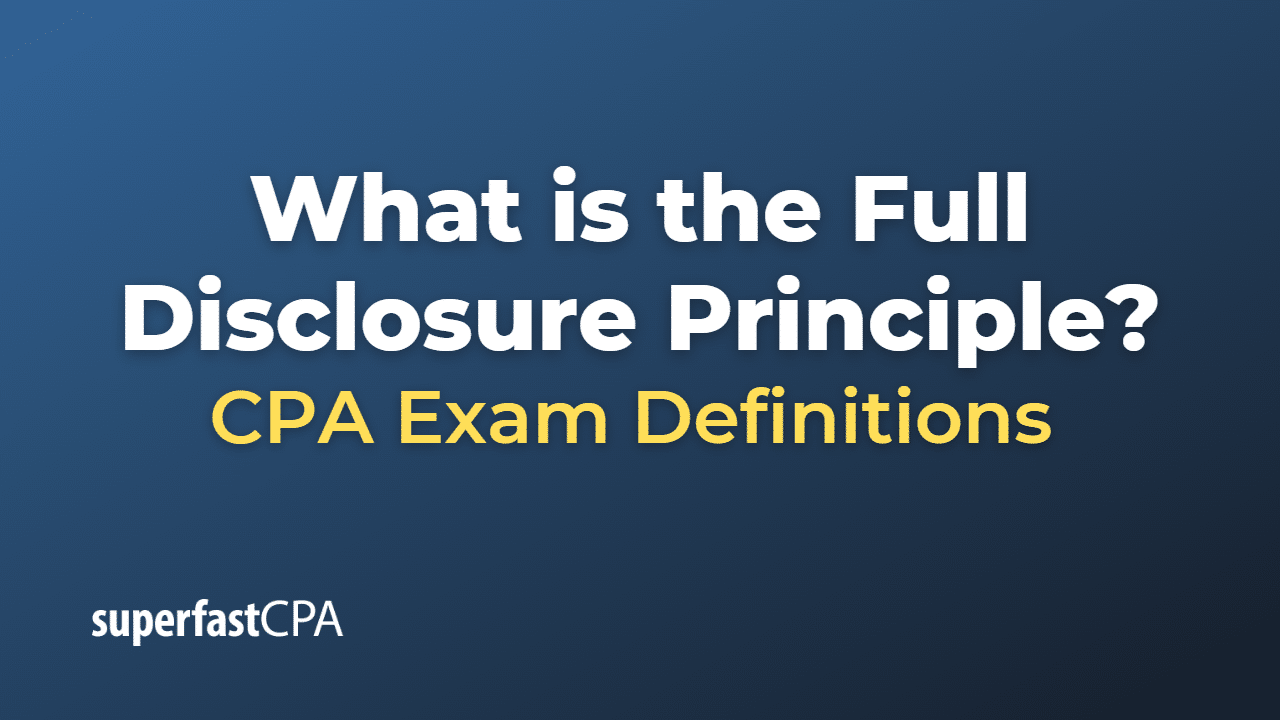21 Jun. 21
Full Disclosure Principle in Modern Accounting Practices

This means that IFRS interpretations and guidance have fewer detailed components for specific industries as compared to US GAAP guidance. As an accountant, the full disclosure principle is important because the notes to the financial statements and other financial documents are subject to audit. To obtain an unqualified (or clean) opinion, one must have an intrinsic understanding of the full disclosure principle to insure sufficient information for an unqualified opinion on the financial audit. Suppose the company has sold any of its products or business unit or acquired another business or another organization unit of the same business.
Company
- One of the most notable changes is the implementation of the International Financial Reporting Standards (IFRS) 15, which addresses revenue recognition.
- The Full Disclosure Principle is meant to encourage full honesty in all matters related to financial statements and transactions so that investors and lenders can feel confident about their decisions.
- Lastly, if you do not disclose all the relevant information, your financial statements will be of no value to investors.
- Textbook content produced by OpenStax is licensed under a Creative Commons Attribution-NonCommercial-ShareAlike License .
- Conservatism states that if there is uncertainty in a potential financial estimate, a company should err on the side of caution and report the most conservative amount.
The increased transparency helps stakeholders better assess the financial health and risk profile of a company. The landscape of financial reporting has seen significant shifts in recent years, driven by evolving regulatory standards and the increasing demand for transparency. One of the most notable changes is the implementation of the International Financial Reporting Standards (IFRS) 15, which addresses revenue recognition. This standard requires companies to provide more detailed disclosures about the nature, amount, timing, and uncertainty of revenue and cash flows arising from contracts with customers. By doing so, it aims to enhance comparability across industries and improve the quality of information available to investors.
Organization
As you may also recall, GAAP are the concepts, standards, and rules that guide the preparation and presentation of financial statements. International accounting rules are called International Financial Reporting Standards (IFRS). Publicly traded companies (those that offer their shares for sale on exchanges in the United States) have the reporting of their financial operations regulated by the Securities and Exchange Commission (SEC).
Great! The Financial Professional Will Get Back To You Soon.

For example, a business might have certain expenses that are paid off (or reduced) over several time periods. If the business will stay operational in the foreseeable future, the company can continue to recognize these long-term expenses over several time periods. Some red flags that a business may no longer be a going concern are defaults on loans or a sequence of losses. The full disclosure principle requires a company to provide the necessary information so that people who are accustomed to reading financial information are able to make informed decisions regarding the company. Most of the accounting standards dealing with different accounting issues prescribe disclosure objectives and requirements.
Ask a Financial Professional Any Question
The disclosure requirements for related party transactions and relationships are governed by accounting standards and regulatory bodies in different jurisdictions. Related party disclosures can also provide insights into potential conflicts of interest that may impact an entity’s decision-making processes or financial performance. The purpose of related party disclosures is to provide transparency and help ensure that financial statements are presented fairly and accurately. Detailed notes can explain the sources and uses of cash, providing insights into the company’s liquidity and financial flexibility.
The growing emphasis on ESG factors reflects a broader recognition that these elements are integral to a company’s long-term sustainability and risk management. These notes offer detailed explanations and additional context that the main financial statements might not fully convey. For example, a footnote might explain the nature of a legal dispute the company is involved in, the potential financial impact, and the likelihood of an unfavorable outcome. This level of detail helps stakeholders gauge the risks and uncertainties the company faces. Another significant aspect is the inclusion of accounting policies and methods used in preparing the financial statements. Different companies might use varying methods for inventory valuation, depreciation, or revenue recognition.
The first step is identifying all relevant information that should be disclosed on your balance sheet, income statement, or cash flow statement. Sometimes non-monetary transactions might also impact a company and its stakeholders. independent trucking company services For instance, the release of an independent director, change in the lending bank, appointment of a new director, and change in shareholding patterns are items that have a material impact but cannot be quantified.
The OpenStax name, OpenStax logo, OpenStax book covers, OpenStax CNX name, and OpenStax CNX logo are not subject to the Creative Commons license and may not be reproduced without the prior and express written consent of Rice University. Exploring case studies related to the Full Disclosure Principle can provide practical insights into its importance and application in real-world scenarios. These examples highlight how the principle is applied and the consequences of not adhering to it. For example, the company is facing a lawsuit resulting from disposing of poison material into the water, and it will be a large penalty.
StudySmarter’s content is not only expert-verified but also regularly updated to ensure accuracy and relevance. Disclosures can also include external commitments such as pension plans or lease obligations, which might not appear directly in the financial statements but affect the organization’s financial health. In addition to meeting regulatory requirements, full disclosure is also an ethical responsibility of entities. Providing complete and accurate information to stakeholders demonstrates a commitment to transparency, accountability, and integrity, which in turn helps to build trust and confidence in the entity and its management. Remember, full disclosure is just the principle to help an entity, especially an accountant, prepare and present financial statements.

